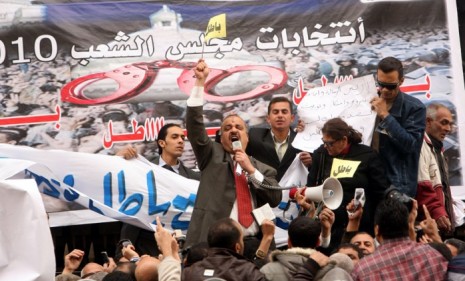Should Americans fear an Islamist takeover in Egypt?
The Muslim Brotherhood is poised to grab a powerful role if Egypt's Hosni Mubarak falls. Would that be disastrous for the U.S.?

A free daily email with the biggest news stories of the day – and the best features from TheWeek.com
You are now subscribed
Your newsletter sign-up was successful
With a popular uprising threatening to topple Egyptian President Hosni Mubarak, Israel is warning that the country could be taken over by Islamic extremists. "It has happened," says Israel's prime minister, Benjamin Netanyahu. "It happened in Iran." But leaders of the Muslim Brotherhood, an Egyptian opposition group, insist they merely want to be part of the "fabric of society." Will Islamists win control of Egypt's government — and would that spell disaster for U.S. interests in the Middle East? (Watch an Al Jazeera report about the protests)
Anti-Western Islamists will soon control Egypt: This is a disaster in the making, says Ron Leshem in Israel's Haaretz. Egyptians will rally behind the Muslim Brotherhood because it is the only group organized enough to deliver "rapid change" — then radical Islamists will "be in control of the best-trained and best-equipped army in the Middle East." The "proponents of sane and secular freedom will wake up too late," just like in Iran, where they fought to kick out the Shah only to be "hanged in the city squares" when the mullahs took over.
"Radical political religion will soon shape the Mideast"
The Week
Escape your echo chamber. Get the facts behind the news, plus analysis from multiple perspectives.

Sign up for The Week's Free Newsletters
From our morning news briefing to a weekly Good News Newsletter, get the best of The Week delivered directly to your inbox.
From our morning news briefing to a weekly Good News Newsletter, get the best of The Week delivered directly to your inbox.
Religion has a place in Egypt's politics: "The Muslim Brotherhood will have a significant role to play in post-Mubarak Egypt," says Reza Aslan in The Washington Post. "And that is good thing." Most Egyptians want their government to reflect Muslim values, but they also are demanding that it enshrine Western freedoms such as freedom of speech. Giving religious organizations a role in politics is always risky, but democracy will only take root the Arab world once more groups, like the Muslim Brotherhood, "are willing to put down their weapons and pick up ballots instead."
"Do Egyptians want both democracy and a role for religion in their government?"
The Muslim Brotherhood would be bad for the U.S.: "Baloney and wishful thinking aside," says Leslie H. Gelb in The Daily Beast, the Muslim Brotherhood "would be calamitous for U.S. security." It "supports Hamas and other terrorist groups, makes friendly noises to Iranian dictators and torturers," and would be an unreliable landlord of "the critical Suez Canal." It also opposes Egypt's 1979 agreement with Israel, "the foundation of peace in the Mideast," and would "endanger" U.S. counterterrorism efforts. "This is a very big deal."
"Beware Egypt's Muslim Brotherhood"
A free daily email with the biggest news stories of the day – and the best features from TheWeek.com
Like it or not, we must live with it: Mubarak has demonized the Muslim Brotherhood, says Bruce Riedel, also in The Daily Beast. But the group swore off violence years ago, and Al Qaeda's leaders, Osama bin Laden and Ayman al-Zawahiri, have "denounced it for decades as too soft" on America. Living with the Muslim Brotherhood "won't be easy," but the group "should not be seen as inevitably our enemy." Besides, this isn't "our decision to make."
-
 The week’s best photos
The week’s best photosIn Pictures An Andean god, a rogue squirrel, and more
-
 ‘Zero trimester’ influencers believe a healthy pregnancy is a choice
‘Zero trimester’ influencers believe a healthy pregnancy is a choiceThe Explainer Is prepping during the preconception period the answer for hopeful couples?
-
 AI surgical tools might be injuring patients
AI surgical tools might be injuring patientsUnder the Radar More than 1,300 AI-assisted medical devices have FDA approval